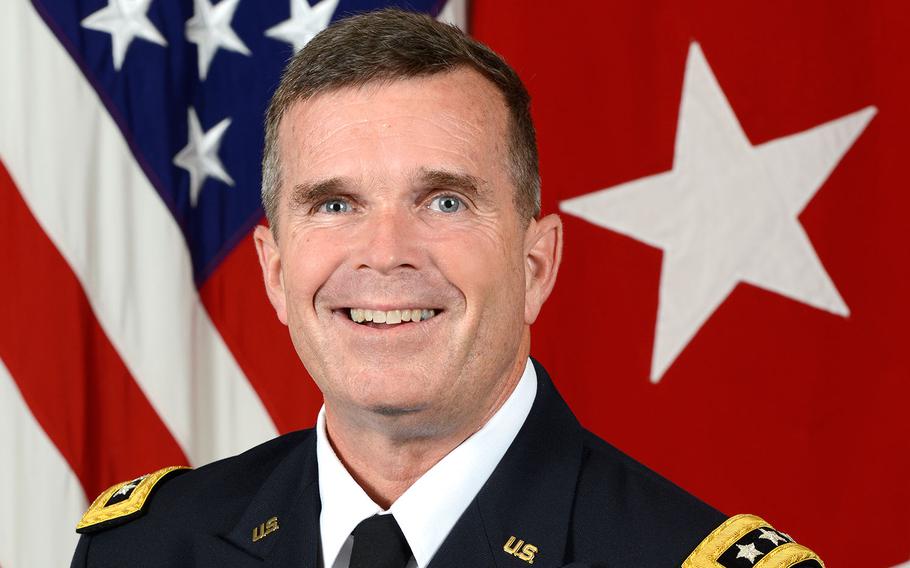
U.S. Army Lt. Gen. Thomas C. Seamands, chief of the Army Human Resources Command. (Monica King/U.S. Army)
WASHINGTON — The U.S. Army quietly made it easier this summer for individuals with some history of mental health problems to enlist in the service, but a top general pushed back Tuesday on a report the Army had relaxed standards to meet increased recruiting goals.
Army officials lowered the authorization level at which the service can approve waivers for potential recruits who have had past “mental health issues,” said Lt. Gen. Thomas C. Seamands, the Army’s personnel chief in a prepared statement. Such waivers once had to be approved at the Army’s headquarters level but can now be considered by U.S. Army Recruiting Command or by state adjutants general for those wishing to join the National Guard, the general said.
Seamands’ statement comes after USA Today reported that people with histories that include “self-mutilation,” bipolar disorder, depression or drug or alcohol abuse have since August been able to seek a waiver to join the Army. The report cites the Army’s recruiting goal of 18,000 new soldiers by September as one of the justifications for the change.
“Recent reports that the Army has changed medical entrance standards for those with mental health issues are inaccurate,” Seamands’ statement read. “The Army has made no such policy change and follows the accession standards prescribed by the Department of Defense.”
Seamands’ described the mental health conditions listed in the report as “unfairly characterized,” but the general did not directly address which past mental health conditions could be waived. In 2009, amid a rash of suicides among soldiers, the Army restricted the use of waivers to allow those with most past mental health issues to join.
The general wrote, as an example, that an individual who underwent behavioral counseling at 10 years old would be banned from military service unless he or she received a waiver.
“We’re not prepared to close the door on such individuals who are otherwise medically, mentally and physically qualified for military service,” he said. “We think this is the right thing for our Army, and the selfless young men and women who wish to serve.”
Army officials did not immediately respond to Stars and Stripes’ requests for information about the recent changes to waivers or for the number of mental health waivers the service has recently approved.
The Army has long issued waivers to recruits seeking entrance for a wide variety of reasons, including criminal history, medical issues, vision problems and age. Typically, when the service is seeking to grow, it accepts more recruits who need waivers to enlist or commission and it takes fewer when the service downsizes.
The waivers are not simple to receive, said two Army recruiting officials who spoke to Stars and Stripes on condition of anonymity because they were not authorized to publicly discuss the issue.
In most cases, waivers must be approved by a general officer, they said. The recruiting officials said they have not been instructed to seek less-than-stellar candidates for the Army.
“We’ve been told we want the best candidates,” one of the officials said. “The command wants quality recruits coming in the Army, they’ve made that very clear, but sometimes to get even those high quality of recruits you need waivers.”
But some of the mental health conditions cited in the USA Today report could be problematic if the Army is considering them, mental health professionals told Stars and Stripes.
“The Army is opening itself up to problems,” said Dr. Elspeth Cameron Ritchie, a former military psychiatrist who retired from the Army in 2010 as a colonel. “There’s always a balance when you need troops. In this case it is not clear why these conditions were chosen.”
If those problems do arise while an individual is serving in uniform, it would be expensive and time-consuming to discharge them, she added.
Worse still, mental health problems could present themselves at inopportune times, such as during a combat deployment, she said.
For example, a history of self-mutilation, such as cutting or burning, typically is a chronic condition and a sign of additional mental health problems, said Dr. Charles A. Morgan, a forensic psychiatrist who teaches at the University of New Haven and Yale University in Connecticut.
Self-mutilation is typically a form of self-punishment and not an attempt at suicide, said Morgan, who regularly works with servicemembers. Such an episode could be high problematic for unit cohesion, he said.
“You don’t just suddenly begin self-mutilating,” Morgan said. “Why take people in the Army who are already vulnerable to conditions we know people who are perfectly healthy are susceptible to in combat situations? I just don’t see good coming from that.”
On Tuesday, Sen. John McCain, R-Ariz., expressed a similar sentiment. The chairman of the Armed Services Committee said he learned of the Army’s policy adjustment from the USA Today report and has not yet received appropriate information from the service.
“I expect answers to these questions,” McCain said during a hearing on Capitol Hill. “Self-mutilation is something that comes home to roost. I don’t quite understand the eligibility there. I hope we can get answers to questions. I’m just not sure that if you take someone in who is doing this things -- the cost over time is very, very, very high.”
Stars and Stripes reporter Claudia Grisales contributed to this report.
dickstein.corey@stripes.com Twitter: @CDicksteinDC